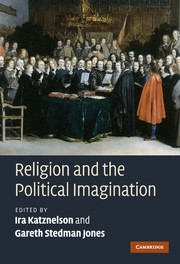Book contents
- Frontmatter
- Contents
- List of contributors
- Acknowledgements
- Introduction: multiple secularities
- 1 Secularisation: religion and the roots of innovation in the political sphere
- 2 Regarding toleration and liberalism: considerations from the Anglo-Jewish experience
- 3 The Enlightenment, the late eighteenth-century revolutions and their aftermath: the ‘secularising’ implications of Protestantism?
- 4 In the lands of the Ottomans: religion and politics
- 5 The Russian Orthodox Church and secularisation
- 6 The American experience of secularisation
- 7 French Catholic political thought from the deconfessionalisation of the state to the recognition of religious freedom
- 8 Religion and the origins of socialism
- 9 From 1848 to Christian Democracy
- 10 The disciplining of the religious conscience in nineteenth-century British politics
- 11 Colonial secularism and Islamism in North India: a relationship of creativity
- 12 The 1960s
- 13 Gendering secularisation: locating women in the transformation of British Christianity in the 1960s
- 14 Does constitutionalisation lead to secularisation?
- 15 Europe's uneasy marriage of secularism and Christianity since 1945 and the challenge of contemporary religious pluralism
- 16 On thick and thin religion: some critical reflections on secularisation theory
- Index
6 - The American experience of secularisation
Published online by Cambridge University Press: 05 June 2012
- Frontmatter
- Contents
- List of contributors
- Acknowledgements
- Introduction: multiple secularities
- 1 Secularisation: religion and the roots of innovation in the political sphere
- 2 Regarding toleration and liberalism: considerations from the Anglo-Jewish experience
- 3 The Enlightenment, the late eighteenth-century revolutions and their aftermath: the ‘secularising’ implications of Protestantism?
- 4 In the lands of the Ottomans: religion and politics
- 5 The Russian Orthodox Church and secularisation
- 6 The American experience of secularisation
- 7 French Catholic political thought from the deconfessionalisation of the state to the recognition of religious freedom
- 8 Religion and the origins of socialism
- 9 From 1848 to Christian Democracy
- 10 The disciplining of the religious conscience in nineteenth-century British politics
- 11 Colonial secularism and Islamism in North India: a relationship of creativity
- 12 The 1960s
- 13 Gendering secularisation: locating women in the transformation of British Christianity in the 1960s
- 14 Does constitutionalisation lead to secularisation?
- 15 Europe's uneasy marriage of secularism and Christianity since 1945 and the challenge of contemporary religious pluralism
- 16 On thick and thin religion: some critical reflections on secularisation theory
- Index
Summary
There are many ways to approach the question of how far the United States is a standing reproach to the ‘secularisation thesis’, not least because there are many versions of that thesis. The strongest version, whose intellectual genealogy runs from Condorcet via Auguste Comte to Max Weber, suggests that religion is irrational and childlike, that modernity promotes rationality and maturity, and that in time religion will be extinguished because redundant. The weaker version argues that religion may be a continuing human need but is a private matter, confined to voluntary associations, but that public institutions (especially the state and education) are obliged to be secular. Within this latter version, one can discern two varieties, rooted in differing estimates of religion: the first mistrusts religion's moral influence as narrow, sectarian and intolerant, and hence incapable of furnishing a shared social morality for the public realm; the second thinks better of religion and acknowledges that it might promote, say, charity or altruism, but is conscious that religions are too plural and particularist to be allowed free rein, because their actions often generate social conflict and disharmony, and that, at best, religions can act in the public realm only when their idiosyncrasies are filtered out. Indispensable to these standpoints, with the exception of the last, is the presumption that, over time, there come to be a growing number of agnostics and atheists, who acquire cultural and social power, which is used either to extirpate or to quarantine the religious.
- Type
- Chapter
- Information
- Religion and the Political Imagination , pp. 132 - 149Publisher: Cambridge University PressPrint publication year: 2010

